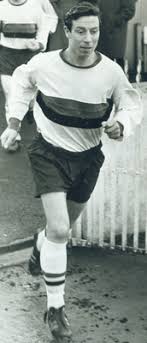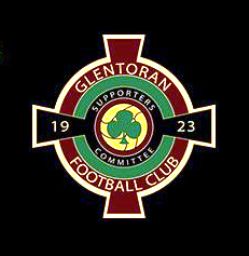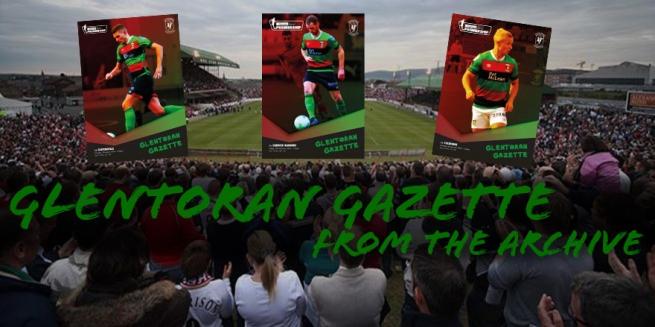
ONE SATURDAY AFTERNOON IN PORTADOWN
The sixth of Brian McClelland's compelling series of articles on significant figures from Glentoran's history. Many thanks to the Glentoran Supporters Committee (1923) for use of this material.
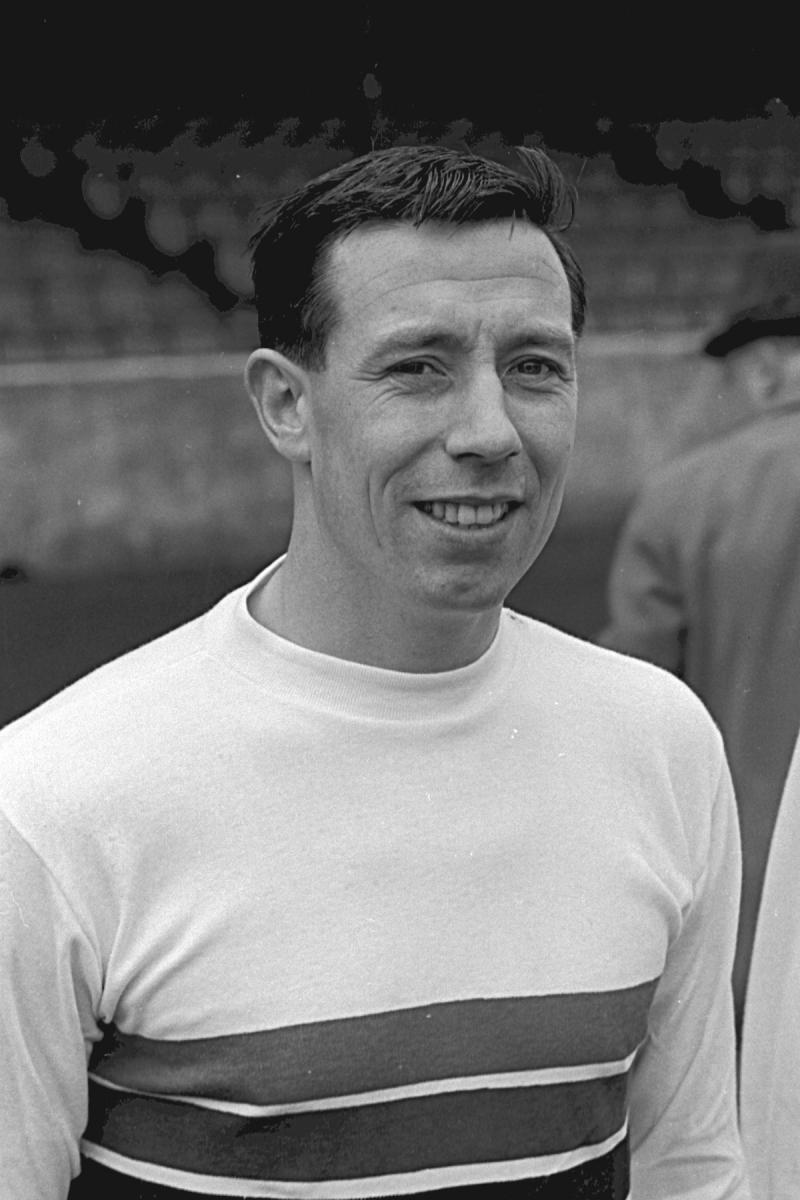
The referee blew a shrill blast on his whistle, pulled out his notebook and asked Wee Walter for his name. “You’re off”, he said, pointing to the changing rooms. The match had lasted a fleeting thirty seconds for Walter, barely enough to light a fag. He had kicked the ball once, collided with Jimmy Jones, had his name taken and disappeared! It was over so quickly that Walter passed Portadown manager, Gibby McKenzie, on his way out.
The three participants in this little set to on 9th February, 1963, were the aforementioned left half of Glentoran, Walter Bruce, Portadown centre forward, Jimmy Jones, and Preston referee, Fred Duxbury. For his part, the little Glentoran half-back was “flabbergasted”.
“I still can’t understand how the referee could possibly have taken exception. Jones went for the ball that stuck in the mud. I put my leg out. I didn’t kick anybody – and I didn’t speak back.”
Now Wee Walter was no angel. He had made a successful switch from inside-forward to wing half. But, undermining his undoubted ability, Walter occasionally displayed a short fuse which, along with his cheeky chappy nature, got him in bother from time to time with referees. Only two weeks before the Jones incident Lurgan referee, Tommy Mitchell reported Walter to the IFA for allegedly throwing snow at Crusaders left –half, Norman Pavis during a league match. Now Norman was a guy you just didn’t tangle with, his “hard man” reputation being well earned. He was, you might say, one of the original Seaview “Hatchet Men”, though a marvellous footballer for all that.
“I only pretended to hit Norman with the snowball,” protested Walter. “No harm was done and worse incidents go unnoticed.” Perky Walter feared he could be labeled the Irish League’s bad boy and, in his benefit year, that was the last thing he wanted to happen. One thing about Walter, he never picked on opponents his own size - they were always bigger!
Now Jimmy Jones was bigger, much bigger. On the cusp of greatness when with Belfast Celtic, Lurgan lad Jones was a real heavyweight, fast and bustling, good in the air and adept with both feet. On Boxing Day, 1848, when playing for Belfast Celtic against Linfield at Windsor Park, he clashed with Linfield’s centre-half, Bob Bryson, who sustained a fractured ankle.
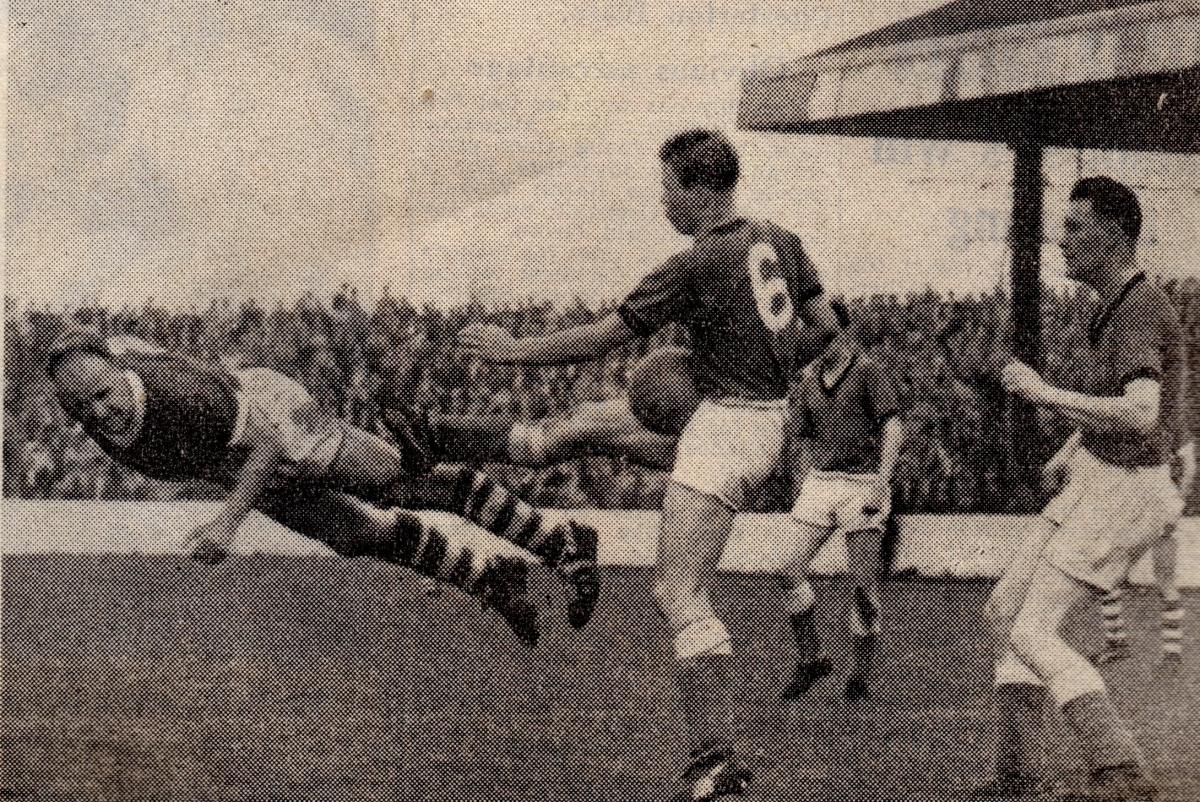
Jimmy Jones plays at the Oval
Bryson had played several games for the Glens in 1940/41, the wartime season which had ended with the Belfast Blitz and the destruction of the Oval. At the end of the game against Linfield Jones was attacked by a group of spectators, kicked and thrown over the raised playing surface on to the terraces below. He suffered a broken leg.
The incident was a major contributing factor to Celtic withdrawing from the game. Gradually Celtic Park became derelict, a sad decaying stadium, populated by the hooped ghosts of yesterday’s heroes; the Charlie Tullys, the Kevin McGarrys, the Paddy Bonnars, and the Mickey Hamills. Today a shopping centre sits sacrilegiously atop its grave, a bizarre memorial to a once great club.
But how did an English referee, Fred Duxbury, come to be in charge of an Irish League game at Shamrock Park between Portadown and Glentoran in 1963? I must confess that I’m not entirely clear as to how this practice came about. I do know the perceived wisdom after the Windsor horror was that cross-Channel referees should be appointed to big local games. Indeed, the 1949 Irish Cup final between Glentoran and Derry City was officiated by a Mr Cox, from Rutherglen in Scotland.
A trawl through football programmes of the fifties and sixties reveals that local referees, including Sam Carswell and Jack Adair, were supplemented by “foreigners" such as Mr. T. Langdale (Bolton), Mr. K. Walker (Blackpool), and Mr. J. Bullough (Preston). Interestingly, famous Yorkshire referee, Arthur Ellis, who had refereed at World Cup Finals in 1950, 1954, and 1958, was in charge of Glentoran’s match against Coleraine in February, 1962.
Respected local journalists, like Paddy Toner, who regarded the Bruce decision as “one of the harshest I have ever seen in football”, pleaded with the IFA senior clubs committee to show some leniency. Notwithstanding, Walter was hi t with a six weeks suspension and a three guineas fine, much to the fury of the Glentoran Board of directors.
The board issued a press release stating that “Glentoran want it clearly understood that they are aggrieved at this suspension, and protest most strongly for and on behalf of their now large following of loyal supporters.”
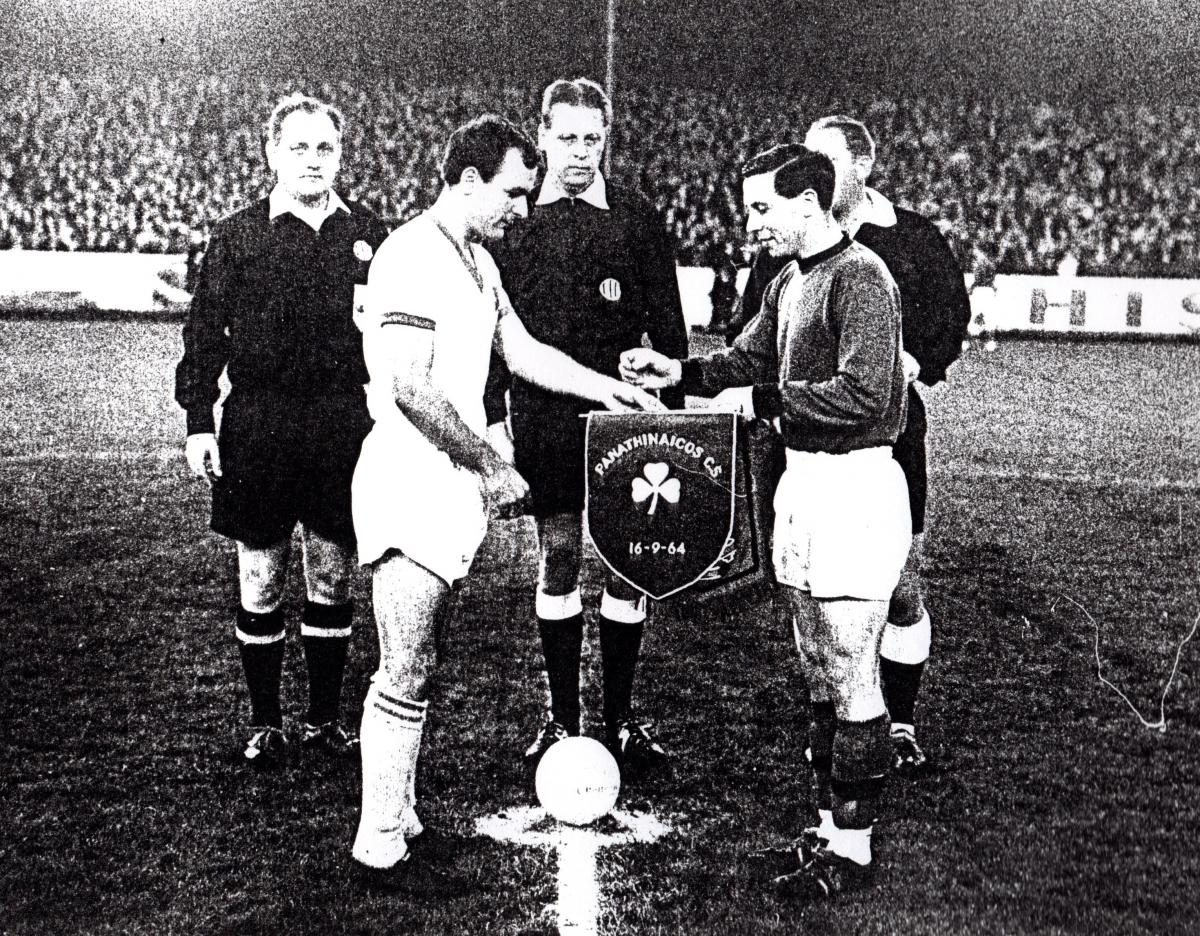
Walter Bruce exchanges pennants with the Panathanaikos captain in 1964
My question is simply this– why was Bruce sent off? In an era when football was renowned for its macho image, and tough tackling a requirement, it is difficult to understand how a referee could send someone off, especially after less than a minute, for what was, by all accounts, a bit of a scuffle in the mud. I do have a theory though, for what it’s worth: The elephant in the room was, undoubtedly, the Jimmy Jones incident of 1948. Contemporary newspaper reports of the Portadown game singularly fail to mention this important detail.
English referee Duxbury was at Shamrock Park because of what happened to Jimmy Jones some fourteen years earlier. He would have been well aware of the story, and likely saw it as his mission to protect Jones no matter what. I have little doubt that Walter Bruce was the victim of over- zealous refereeing on this occasion, and suffered accordingly.
Glentoran, a man short and fighting a rearguard action throughout, duly won the game 1-0 via an Arthur Stewart goal against a Portadown side captained by the redoubtable Wilbur (Billy) Cush.
Footnote: This story is merely a snapshot of Walter Bruce’s football career. If you were to ask me to write a book on the ten most influential footballers ever to play for Glentoran, Walter Bruce would be right in the mix. I also saw Jimmy Jones play on many occasions. He won three caps and scored a record 74 goals for Glenavon in season 1956-7. He was a player Glenmen just loved to hate, likely because he scored so many goals against us!
